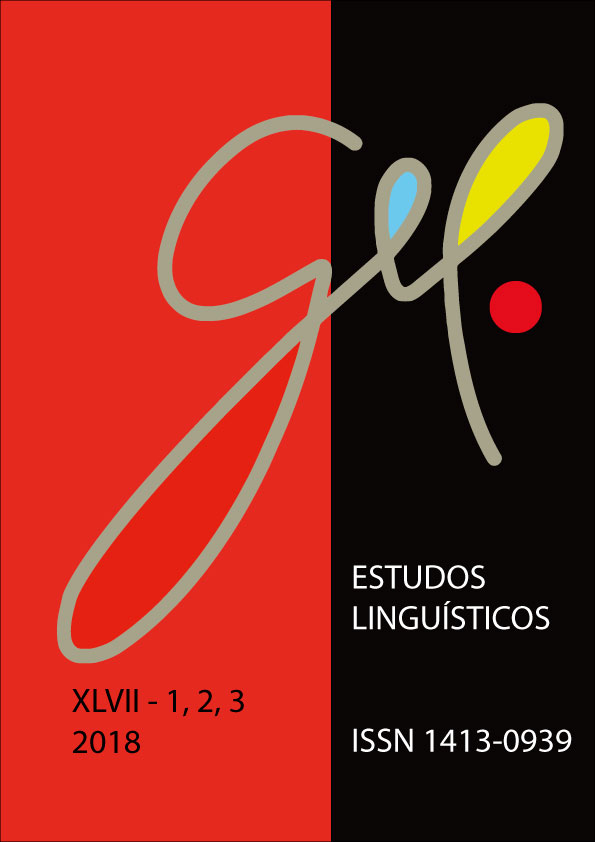Meaningful words of Clarice Lispector extracted from two books of the author and characteristics of normalization in their respective translations
DOI:
https://doi.org/10.21165/el.v47i2.1926Keywords:
translation studies, Corpus linguistics, normalizationAbstract
The present research aims to observe the behavior of different translators facing similar and reused fragments extracted from two books written by Clarice Lispector. The other objective is to verify these translators’ choice concerning two of the authors’ reoccurring words: silence and eyes. We have, as theoretical framework, Corpus-based translation studies (BAKER, 1993, 1995, 1996, 1999, 2004); studies on normalization (SCOTT, 1998); Corpus linguistics (BERBER SARDINha, 2004) and the author’s critical heritage (NUNES, 1995; SÁ, 2000). As methodological procedure, the research was carried out by means of a combination of semimanual and computerized investigation. Drawn on Scott (1998), we examined the translation of the selected words in relation to aspects of normalization. The final results point at a certain tendency to normalization in relation to both translators in question.Downloads
References
BAKER, M. Corpus linguistics and translation studies – Implications and applications. In: BAKER, M.; FRANCIS, G.; TOGNINI-BONELLI, E. Text and technology: in honour of John Sinclair. Amsterdam/Philadelphia: John Benjamins, 1993. p. 233-250.
BAKER, M. Corpora in translation studies: an overview and some suggestions for future research. Target, Amsterdam/Philadelphia: John Benjamins, v. 7, n. 2, p. 223-243, 1995.
BAKER, M. Corpus-based translation studies: the challenges that lie ahead. In: SOMERS, H. Terminology, LSP and translation studies in language engineering: in honour of Juan C. Sager. Amsterdam/Philadelphia: John Benjamins, 1996. p. 175-186.
BERBER SARDINHA, T. Automatic Identification of Segments in Written Texts. Unpublished PhD Thesis, University of Liverpool, Liverpool, 1997.
BERBER SARDINHA, T. Linguística de Corpus. São Paulo: Editora Manole Ltda. 2004.
CHEVALIER, J.; GREERBRANT, A. Dicionário de Símbolos. Tradução de Vera da Costa e Silva et al. Rio de Janeiro: José Olympio, 1990.
LISPECTOR, C. A Descoberta do Mundo. Rio de Janeiro: Editora Rocco, 1987.
LISPECTOR, C. Discovering the World. Tradução de Giovanni Pontiero, Manchester: Carcanet Press, 1992.
LISPECTOR, C. Uma Aprendizagem ou O Livro dos Prazeres. Rio de Janeiro: Editora José Olimpio, 1969.
LISPECTOR, C. An Apprenticeship or The Book of Delights. Tradução de Richard A. Mazzara e Lorri A. Parris. Austin: University of Texas Press, 1986.
NUNES, B. O Drama da Linguagem: uma leitura de Clarice Lispector. 2. ed. São Paulo: Ática, 1995.
OWEN, H. Giovanni Pontiero’s Translation of Clarice Lispector’s Discovering the World. In: ORERO, P.; SAGER, J. C. The Translator’s Dialogue. Amsterdam/Philadelphia: John Benjamins Publishing Company, 1997.
RANZOLIN, C. R. Clarice Lispector Cronista: no Jornal do Brasil (1967-1973). 1985. 430 f. Dissertação (Mestrado em Literatura Brasileira) – Faculdade de Filosofia, Letras e Ciências, Universidade Federal de Santa Catarina, Florianópolis, 1985.
SÁ, O. A Escritura de Clarice Lispector. Petrópolis: Editora Vozes, 2000.
SCOTT, M. N. Normalisation and Reader’s Expectation: A Study of Literary Translation with Reference to Lispector’s A Hora da Estrela. 1998. 318 f. Tese (Doutorado em Filosofia) – Universidade de Liverpool, Liverpool, 1998.
TOURY, G. The Nature and Role of Norms in Translation. 1978. In: VENUTI, L. The Translation Studies Reader. London: Routledge Press, 2000. p. 198-213.
VENUTI, L. The Translator’s Invisibility: A History of Translation. New York: Routledge, 1995.



